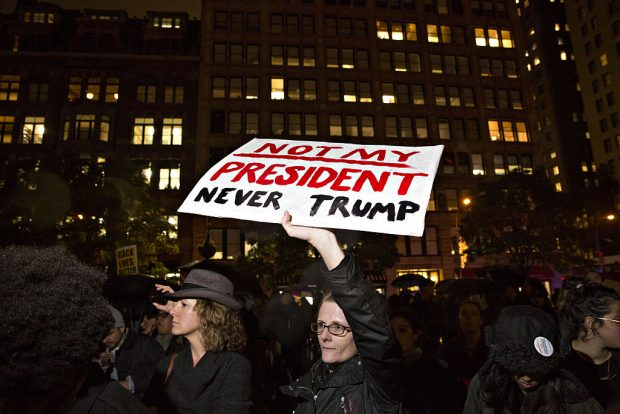Plenty of Republicans were not in the mood to celebrate on election night. About 200 gathered at the Lincoln Restaurant in Washington DC, where they had hoped they could watch a heavy defeat for Donald Trump and begin the process of returning their party to its centre-Right origins. Instead, people began drifting home before midnight.
Since then, Republicans of the Never Trump variety have had to wrestle with what comes next, questioning whether the party of Lincoln can ever recover and what their place in it might be. People like Meghan Milloy, who has been a Republican since her school years but who campaigned against her own party by helping set up ‘Republican Women for Hillary’. ‘A lot of folks were in shock,’ she said. ‘There wasn’t much talking for the first few days. People were giving each other space.’
Most had assumed a defeat for Trump would mean a chance for the Republican Party to regroup and rebuild in its original image. Instead, her group has had to begin the process of repositioning, renaming itself ‘Republican Women for America’ and setting itself the task of becoming a watchdog. They plan to ensure Trump sticks to some of his promises – such as not overturning the Supreme Court decision legalising gay marriage – and will campaign against his less palatable pledges, such as deporting as many as 11 million immigrants. ‘We are going to work to move the party more towards the centre,’ she said. ‘We have women in our group that have expressed interest in running for office to prove that the Republican Party is not just about Donald Trump and Steve Bannon. It is about people who aren’t racist and who aren’t misogynist.’
The approach is similar to some of the party’s high-profile internal critics. Senator Lindsey Graham, who likened the choice in the primaries between Trump and Ted Cruz to being given a choice between being shot or poisoned, was quick to set aside his epic trolling and congratulate the president-elect once victory was sealed.
His most ardent critics inside the party have been muted by the shock of Tuesday night. And the scale of Trump’s win – capturing battleground states such as Ohio, Florida and Pennsylvania, as well as being on course to snag the reliably Democratic Michigan – eliminated a rather bolder plan B.
That rested with the fortunes of Evan McMullin, a former CIA agent who emerged as an eleventh-hour, Never Trump candidate. A strong showing would have had his backers wondering whether his moderate, conservative message – visiting a mosque and offering undocumented immigrants a path to legal status – might not provide the blueprint to a new centre-right party, one that picked up the traditions of Edmund Burke and Ronald Reagan even as Trump and Bannon ripped them out of the GOP.
If McMullin, a Mormon, could clinch Utah, a state where Trump’s ‘New York values’ meant he struggled to win support, then Plan B was a goer. In the event, it was swept away in a Trumpquake, like Hillary Clinton’s hopes of becoming the first female president. McMullin could manage only third place with a disappointing 22 per cent of the vote.
With the Senate and House remaining firmly in Republican hands, and Trump now preparing for the White House, there seems precious little room for a new party. For now, Never Trump means sitting tight. As William Kristol, editor of the Weekly Standard and another high-profile Never Trumper, puts it:
‘In a way, conservative stance toward Trump is simple: Help him when he’s right, push him to be right if possible, and oppose him when wrong.’
Listen to Freddy Gray and Grover Norquist on Trump’s relationship with the Republican party







Comments